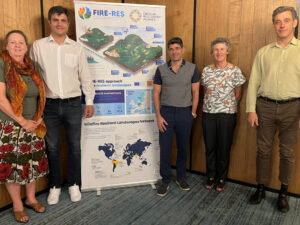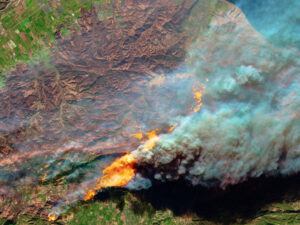New network launched at a reception attended by His Majesty King Charles III, ahead of COP28 in Dubai, UAE.
The new initiative led by the Circular Bioeconomy Alliance and the Commonwealth Secretariat brings together scientific and indigenous knowledge on wildfires to create resilient landscapes.
Planned initiatives include action on the ground via Living Labs, and the development of innovative financial tools with the finance industry.
The Wildfire-Resilient Landscapes Network was launched at a reception attended by His Majesty King Charles III of the United Kingdom, on 30 November ahead of the start of COP28, in Dubai.
In an effort to spearhead the transition to fire-resilient landscapes, the Circular Bioeconomy Alliance has established the Wildfire-Resilient Landscapes Network together with the Commonwealth Secretariat. The network brings together indigenous and scientific knowledge to develop Living Labs that demonstrate how to create fire-resilient landscapes in fire-prone areas of the world. The initiative will work with the finance industry to develop innovative financial tools (for example around emerging Nature markets) that can generate the necessary investments to support the transition to resilient and climate adapted landscapes at a global level.

From left to right: Val Charlton (FIRE-RES), Antoni Trasobares (CTFC Director and FIRE-RES coordinador), Marc Palahi (CBA Director), Ruth Ryan (FIRE-RES), and Sam Johnston (ISFMI Director) during the working session on November 29th.
The European project FIRE-RES and the Savanna Fire Management Initiative (ISFMI) have been invited to set the basis of the new network. FIRE-RES, will bring their scientific knowledge to bear, and the ISFMI, will contribute their unique indigenous knowledge and experience in wildfire risk.
Climate change is resulting in unprecedented wildfires, as fire suppression has reached its limits. The world is witnessing escalating human casualties and serious health impacts, as well as huge economic losses, increased greenhouse gas emissions, and catastrophic loss of the natural world. This summer we witnessed extreme wildfire events, with Canada now experiencing its most severe wildfire season on record. More than 18.5 million hectares of land has been burned (as of 2nd October) and this has resulted in emissions of more than 2.2 billion tons of CO2 equivalents, likely tripling the annual greenhouse emissions of Canada’s entire economy.
Innovative financial tools are also needed to play a catalytic role. Currently, the costs related to wildfire prevention and landscape management comes from public subsidies, which is insufficient to deal with the scale of the problem faced globally. Private-public partnerships and private finance are crucial for deploying investments at scale to harness new technologies and create a new model for designing resistant and resilient landscapes. In this context, carbon and possibly also the future biodiversity markets provide an interesting opportunity for private finance.
 FIRE-RES is an international research and innovation project that works towards developing holistic and integrated fire management strategies to address the problem of Extreme Wildfires efficiently and effectively. The FIRE-RES consortium is formed by researchers, emergency-response bodies, technological companies, industry, and civil society from 13 countries, linking to broader networks in science and disaster reduction management. The Forest Science and Technology Centre of Catalonia, Spain, coordinates the FIRE-RES project, which is funded under the European Union’s H2020 research and innovation programme.
FIRE-RES is an international research and innovation project that works towards developing holistic and integrated fire management strategies to address the problem of Extreme Wildfires efficiently and effectively. The FIRE-RES consortium is formed by researchers, emergency-response bodies, technological companies, industry, and civil society from 13 countries, linking to broader networks in science and disaster reduction management. The Forest Science and Technology Centre of Catalonia, Spain, coordinates the FIRE-RES project, which is funded under the European Union’s H2020 research and innovation programme.
The savanna fire management programme across northern Australia is a good example of how indigenous knowledge can be the basis for new financial tools that generate income for Indigenous Communities, while supporting resilient landscapes through carbon markets. The network will build upon the work of the International Savanna Fire Management Initiative, which has developed leading technologies based on traditional fire management (TFM) approaches deployed in the management of land for generations, while generating carbon credits. The application of TFM has delivered substantial additional benefits including creating market-based jobs in remote and vulnerable communities, and improving biodiversity, food security and health.
Commonwealth Secretary-General, the Rt Hon Patricia Scotland KC said: “The Commonwealth looks forward to contributing to this timely collaboration on wildfire resilience. Our climate work is rooted in knowledge sharing – from helping vulnerable countries unlock critical access to climate finance to climate-related capacity development and the promotion of climate-resilient and sustainable land management.”
Marc Palahí, CEO of the Circular Bioeconomy Alliance, said: “We are honoured to host this network which will build on the success of our Living Labs and connect the dots between science, indigenous knowledge, and the financial sector to enable a holistic approach to creating wildfire-resilient landscapes. As leaders gather to agree climate action at COP28, the start of this collaborative endeavour will facilitate vital progress on the ground that works to embed resilience, while contributing to nature protection as well as climate adaptation and mitigation efforts.”
Antoni Trasobares, coordinator of the FIRE-RES project and director of the CTFC, said: “This alliance will allow the development and implementation of new legal frameworks to boost the creation of innovative financial instruments that, through private capital, will complement the traditional public funding to support land management. Through its participation in the Wildfire-Resilient Landscapes Network, FIRE-RES may expand its activity beyond its current network of living labs, for instance to Australia, South Africa, or Canada, while consolidating as well the upscaling approaches through innovative financial tools.”
Cissy Gore-Birch, on the Advisory Committee of the ISFMI, said: “Reigniting Indigenous fire management practices is an opportunity to share our knowledge with the world, to secure all of our futures and bring us together.”
Last modified: 10 April 2024










